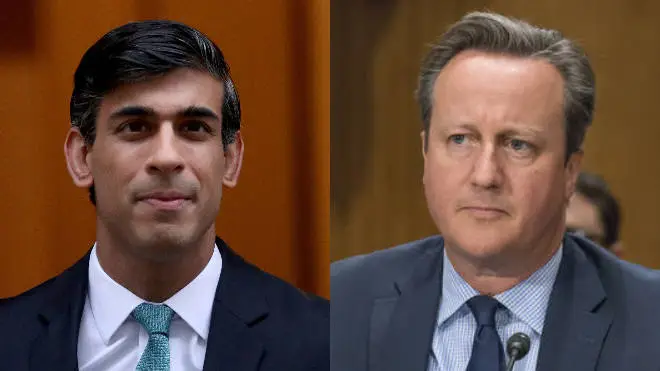
Ian Payne 4am - 7am
14 June 2021, 12:09 | Updated: 14 June 2021, 13:25

Ministers and senior government officials should be banned from political lobbying for up to five years after leaving office, the standards watchdog has recommended following the David Cameron-Greeensill Capital lobbying scandal.
The review by the Committee on Standards in Public Life said there is a need for "significant reform" to the rules and that the current two year ban on ministers and top civil servants lobbying their former colleagues "may be too short in some cases".
The findings, put forward by head of the standards watchdog and former MI5 chief Lord Evans, follow calls for an overhaul to the system prompted by David Cameron's lobbying activities on behalf of Greensill Capital.
As there were more than two years between his resignation as prime minister and taking up his role at the failed financial firm, Mr Cameron's actions were permissible under current rules.
He was also not required to bring this to the attention of the Advisory Committee on Business Appointments, which considers applications under the business appointment rules about new jobs for former ministers and officials.
Read more: David Cameron grilled by MPs over collapse of Greensill Capital

David Cameron accused of WhatsApping his way round Whitehall by MP at Treasury Committee
But the report by Lord Evans said the current rules risk undermining the Seven Principles Of Public Life, which are the basis of the ethical standards expected of those who hold public office.
To prevent this, the committee suggests that rules should be amended to allow for a longer ban on lobbying, not exceeding five years.
The committee named Mr Cameron when it also recommended that lobbying of ministers through "informal channels" such as WhatsApp should be reported to civil servants.
"For this reason, former prime minister David Cameron's extensive lobbying of ministers and officials on behalf of Greensill Capital in late 2020 was not included in any departmental disclosures," according to the findings.
Read more: George Eustice tells LBC 'everyone conducted themselves as we would expect' over Greensill

Starmer: Greensill scandal is 'just the tip of the iceberg'
Mr Cameron placed calls and sent dozens of texts and emails to ministers and senior officials as he tried to win access to Covid support programmes for the since-collapsed financial firm.
Appearing before the Commons Treasury Committee in May, Mr Cameron insisted there was "absolutely no wrongdoing" in his lobbying attempts, but accepted that former prime ministers must "act differently".
When asked by MPs how much he stood to gain from his involvement with the financial firm, he said only that he had a "big economic investment" in its future and that it was "far more than what I earned as prime minister".
Read more: David Cameron's lobbying texts to Sunak and Gove released

David Cameron: 'I was paid far more by Greensill than what I earned as prime minister'
Labour has accused the government of "cronyism" over the lobbying scandal and called for the creation of "an integrity and ethics commission to restore transparency and accountability back into the heart of government".
The Public Relations and Communications Association, which represents around 35,000 PR professionals, has also welcomed Lord Evan's recommendations to tighten the lobbying rules.
The body said they are "delighted" that the standards committee "is calling for... the revolving door of former ministers becoming lobbyists soon after leaving office... to be closed"